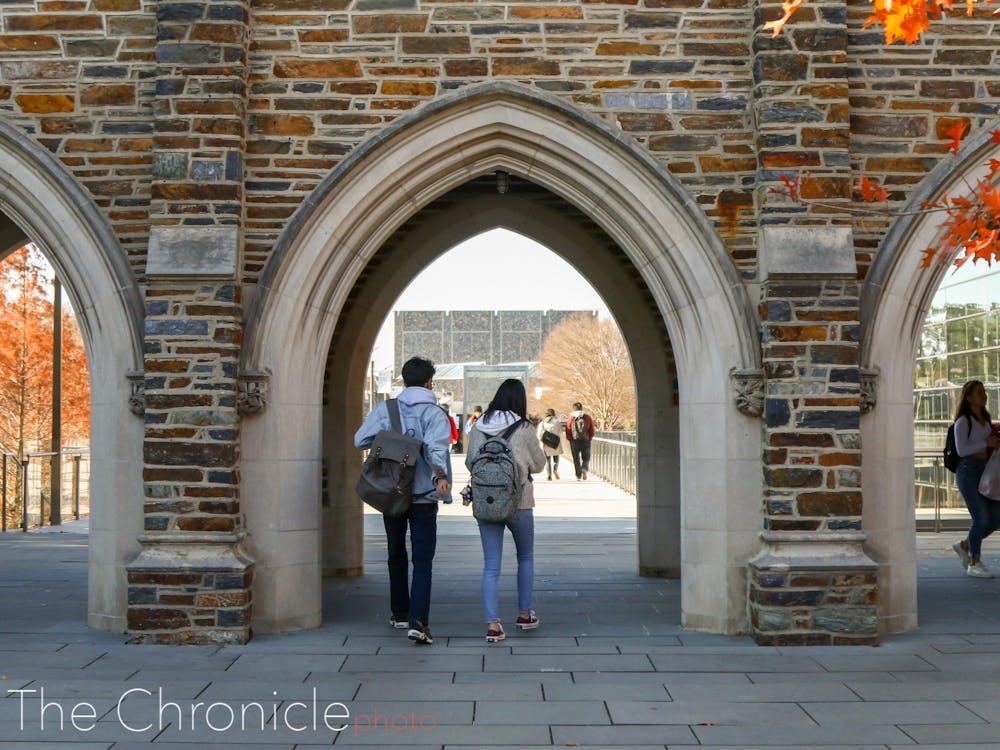Update: This story was updated at 9:23 p.m. Friday with information from President Vincent Price and Provost Sally Kornbluth’s email to faculty, including that students will have to re-register for Fall courses and that faculty will not be required to teach on campus if they have concerns about health and safety.
Duke is planning changes to the academic calendar, multiple course-delivery methods and new living guidelines as it prepares for the upcoming academic year.
President Vincent Price updated the Duke community on planning for the upcoming academic year in a Friday message to students and families. Current plans include starting the Fall semester early and the Spring semester late; offering in-person, hybrid and remote courses; and implementing new guidelines for on-campus living.
“Our goal is to enable as many of our students who are able and who choose to participate in an on-campus experience for the fall semester to do so, but only if it can be done safely,” Price wrote.
All the information in the message is subject to change, based on public health guidance and other variables. Price wrote that Duke is still on track to decide on “many” details about the academic year by the end of June, and he noted that future updates will include information about course registration and re-registration as well as housing assignments and new student orientation.
Duke will accommodate students who choose not to come to campus, return home or are quarantined, Price wrote. Those students will still be able to “engage in a full curriculum of courses.”
There will be several changes to the academic year, intended to minimize travel during the semesters.
Fall 2020 classes will begin Aug. 17, a week early, and Price wrote that Duke expects students’ arrival to be staggered over several days. There will be no fall break, and final exams will end before Thanksgiving. Duke is still planning first-year orientation, but expects students to arrive during the week of Aug. 10, with orientation including online programming before they come to campus.
Spring 2021 classes will begin a week later than normal, on Jan. 19. There will be no spring break, and exams will take place the week of April 26. Commencement for the Class of 2021will be held May 9.
Graduate schools will operate on calendars “specific to their needs” and notify their students directly about schedules, Price wrote.
Students will need to re-register for the Fall semester because of the calendar changes and changes to classroom spaces, and faculty and schools will need to revise course schedules, Price and Provost Sally Kornbluth wrote in a Friday email to faculty about Duke’s current plans. The email, a copy of which was obtained by The Chronicle, contained similar information to Price’s message but provided more details on planned changes to courses and teaching.
It similarly specified that all information is subject to change based on medical advice and other factors.
Duke plans for classes to take place in venues like “theaters, conference and commons rooms, studios, and tents,” Price and Kornbluth wrote, to allow for distancing and other safety measures. The University will provide a “calendar framework” with new classroom spaces and course timeslots by June 4 and will ask schools to submit new schedules by June 19.
If students are on campus, courses will be offered in one of three ways: in-person instruction, online courses and “hybrid courses” that combine in-person and remote learning, Price wrote in his message to students and parents. Price and Kornbluth’s email noted that all in-person classes will have online versions to accommodate students who aren’t on campus or need to quarantine.
Price and Kornbluth wrote that large lecture classes will be organized into smaller sections or made into “flipped or hybrid courses.”
Courses that include requirements like labs, performances or travel will be revised to allow for physical distancing and online access, Price wrote, though he acknowledged that may not be possible in all cases. He wrote that Duke is looking to create “‘immersion’ periods” for students to come to campus to complete course components like labs.
Price and Kornbluth specified in their email that “no faculty will be required to teach on campus if they have concerns about their health and safety,” and faculty will not have to disclose personal health concerns.
In his message to students and families, Price also outlined new set of guidelines for on-campus living called the “Duke Compact.”
Before starting classes, all students living on campus will be tested for COVID-19. All Duke community members will then be required to practice physical distancing, and wear masks in classrooms and public settings. Students will also have to self-monitor their health and report daily through a “monitoring app,” Price wrote. Faculty and staff will also have to complete those health checks, according to the email from Price and Kornbluth.
Those who have reported symptoms and become ill or exposed to COVID-19 will have to follow “testing, contract tracing, and quarantine protocols” established by Duke, Durham County and the state, according to the message. Students will also be expected to remain in the Durham area during the semester.
Get The Chronicle straight to your inbox
Sign up for our weekly newsletter. Cancel at any time.
While many extracurricular activities will shift online, Price wrote that there will still be chances for “in-person gatherings that meet university and public health guidelines.”
Access to campus facilities will be restricted, with new guidelines for “space configuration, capacity, traffic flow, cleaning, and sanitation protocols.” Dining locations will have expanded take-out options and limited in-person service with reservation systems.
“Success will only be achieved if all members of the Duke community do their part—which will call upon extraordinary mutual support, clearly articulated behavioral norms, and an unshakable personal commitment,” Price wrote.
This is a developing story and will be updated if new information becomes available.
Matthew Griffin was editor-in-chief of The Chronicle's 116th volume.

